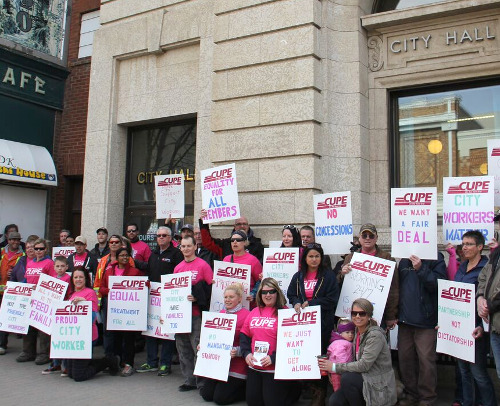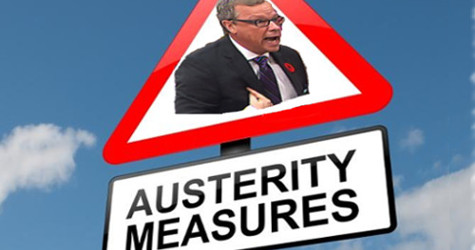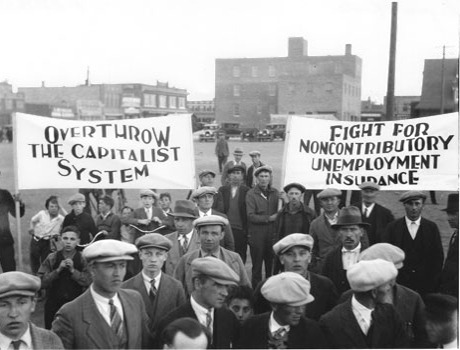Saskatchewan Premier Brad Wall had already broken one promise even before he called the election: “We didn’t make a lot of election promises, but we made one significant one – to keep Saskatchewan strong” (Regina Leader-Post, 18 June 2016) – unless, of course, you embrace that old bromide, “what doesn’t kill you makes you stronger.” The post-election sky of the Sunshine Premier has darkened as the spectre of economic collapse haunts him. Despite his glorious history making third term (finally humbling the CCF/NDP, the former natural governing party of the province), Wall’s fresh mandate in office has quickly become a nightmare. The next years look ugly and Wall will bear the responsibility, just as he eagerly took credit for the boom times he squandered during his first two terms.

Wall knew the collapse was coming, hence his refusal to present a budget in the run-up to the election. But he remained in denial, clinging to the fantasy that the prices for oil and potash might rebound staving off disaster. Wall’s fantasy is now in tatters. How bad is it? Though Wall hid it, his government racked up deficits in six of the last nine years while claiming balanced budgets. By 2017 the public debt (accumulated deficits and borrowing) will reach almost $15-billion; by 2020, almost $16-billion. To put it another way, about $13,000 of debt for every child, woman, and man in the province, will rise to $15,000 in 2020, rivalling the per capita debt left by former Conservative Premier Grant Devine upon defeat in 1991.
Sunshine Premier, Doom and Gloom Economy
As the resource collapse reverberates through the spin-off general economy, the news gets worse each day: rising unemployment; a cascade of lay-offs; closures of businesses and industries; low job creation; a tanking of capital investment; drops in retail sales, manufacturing shipments, and housing starts – in other words, general economic stagnation and decline. Overall the Saskatchewan economy shrank by 1.4% in 2015 – only Alberta and Newfoundland fared worse, shrinking by 4% and 2.2% respectively. Wall’s never-ending drivel about growing economic diversification is just so much Babbitt boosterism. The Saskatchewan economy is no more diversified than it was a decade and more ago; energy still comprises 25 per cent of the provincial economy.
Wall’s former cheerleading media chorus, which previously expressed general, occasionally qualified, enthusiasm for the Wall government, has dramatically changed its tune. When the Regina Leader-Post‘s Murray Mandryk routinely characterizes Wall with terms like “dishonest,” “mean-spirited,” “desperate,” “shill for the oil industry,” and “bleeding school divisions to death,” you know there has been a seismic shift. The Regina Leader-Post‘s financial editor, Bruce Johnstone, who never quite bought into Wall’s voodoo economics, finally became brutally frank about Wall’s economic development strategy, describing it as “a shambles.” Each day, the news pages of the Regina Leader-Post and the Saskatoon Star Phoenix are full of bad economic news; it has become impossible to ignore and even more impossible to give it a positive spin. Reality sometimes trumps ideology.
Wall’s Brutal Message to Labour
Wall’s June budget reveals the approach he intends to take: no tax or resource royalty increases, death by a thousand cuts, and selling off public assets. The budget was a modest incursion into the savage neoliberal slash and burn to come – both a trial a balloon and a portent of things to come. He is going to consolidate and reduce the number of health and school divisions. The budget cut programs for the weak and vulnerable: aboriginal court workers, the Buffalo Narrows jail, apprenticeship training funding the seniors’ and children’s drug plan; the education employment supplement, benefits for vulnerable families – and probably a lot more hidden away in the budget documents and the internal budget changes to come. Wall threw down the gauntlet to the trade union movement by refusing to fully fund the 1.9% salary increase his government negotiated with teachers. Half of the cost has been downloaded on school divisions resulting in staff cuts, program cuts, increased class sizes, and deferred maintenance. The message to labour is brutal: we are coming to get you regardless of the rules of collective bargaining.
Then Wall floated the privatization of SaskTel (only after a referendum) and approved the establishment of 40 private liquor stores in rural areas. What’s he up to? Does he plan to drive us into a deep inescapable chasm of debt (remember, no tax increases, so that’s out), and then declare a state of fiscal emergency? Then, with a somber and sad face, will he hold a referendum to free his government to sell off public assets if necessary? One can see the choice on the ballot now: do you favour a huge increase in taxes or selling off some or all of the Crown’s assets? One can also imagine the orchestrated fear campaign designed to stampede voters to the correct neoliberal conclusion.
Ineffectual NDP Leaves Wall’s Favourtism Unchecked
Wall’s budget also sent a clear message to his loyal rural bastion: you will be sheltered in the coming storm. While Health got a 1.5% increase and Education 1% (both needed at least 5% to hold the line), Agriculture received a dramatic 7.5% increase. And the government will borrow $1-billion for infrastructure renewal, most of which will go for roads (dear to a farmer’s heart). More than that, by declaring “no tax increases” as the budget’s central promise, Wall is telling his rural base that the big, unsustainable education tax cuts previously given to rural and small town Saskatchewan are safe. So too is the $120-million farmers get each year in fuel tax exemptions. Further, while Wall’s jaundiced eye turns to “rationalizing” (or shall I say, “transformationalizing”?) health and school divisions, the 297 rural municipalities serving 220,000 rural residents are safe from scrutiny, secure in their annual provincial grants. This has got to be the winning example of bad, politically motivated governance (or can one say, political corruption on a class scale?). This blatant favouritism to rural Saskatchewan is an example of Wall’s increasing arrogance. Given his mandate in the last election, he believes he is unassailable.
Sadly, Wall in fact appears to be unassailable for now, given the ineffectiveness of the NDP Opposition. So far the NDP has not responded with a sustained, coherent critique of Wall’s program of government that is rooted in a clear alternative vision and backed up with an alternative economic development strategy. Rather, committed as it is to neoliberalism with a human face, all the NDP can do is nibble around the edges with minor criticisms. It has not been able to bring itself to say yes to progressive tax increases; yes to increased resource royalties and rents; yes to a public economic development strategy; yes to massive investments in health, education and public infrastructure; and yes to a public energy Crown to develop green alternatives to coal, oil and natural gas.
Wall deserves to leave office under an even darker cloud than either Ross Thatcher or Grant Devine. And as things unravel around him, that just might be in the cards. •





